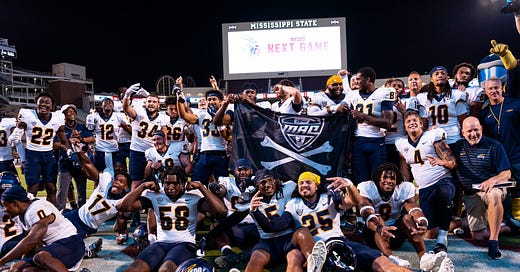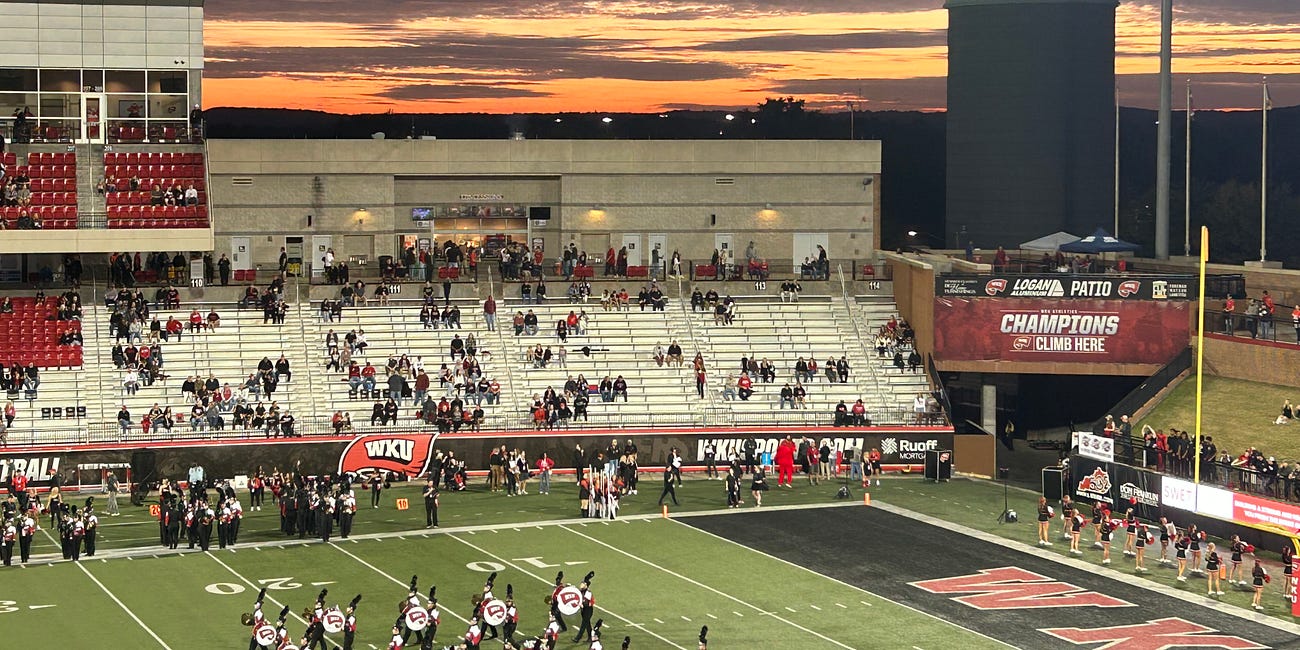The battle for the 12-seed is the star of the 2024 college football season
The reserved spot in the College Football Playoff for non-power conference teams is turning the 2024 season into a nationwide, season-long single-elimination survival test.
There’s a small moment I’ll always remember from my trip to Missoula to see last year’s Brawl of the Wild, the Big Sky Super Bowl between elite FCS programs Montana and Montana State.
Montana is famously sparse until the whole state crams into a stadium built between a mountain and a river. Then it’s packed with deeply rooted Montana beef. Everybody from Missoula wanted to explain why Bozeman sucks, and everybody from Bozeman wanted to explain why Missoula sucks. The chants of FTC and FTG blended together, to the point where you had to see which color people were wearing to determine which mascot they thought should get F’ed. There were stories about families where one brother played for the Cats and another played for the Griz. Everything about this rivalry was intertwined with life in this big-yet-small state.
But sometime in the second half came a dispatch from another realm. The scoreboard and PA announcer revealed a stunning result: the 1-9 Wofford Terriers had defeated the No. 2-ranked Furman Paladins. And the crowd went wild.
Everybody in the stadium understood the stakes. With Furman going down, Montana would surely get the No. 2 seed in the FCS playoffs. That would guarantee them homefield advantage through the national title game. That meant teams from the South and the East Coast would have to get on 5-hour charter planes all the way up here, crossing the Continental Divide to play in front of 20,000 screaming Montanans in December. Long story short: That loss in South Carolina meant Montana was going to make the national championship game. Sure enough, they did.
Surely, nobody in the building had gone to Wofford or Furman, or knew anybody that did. But on a day when the beef was so local, that big news from someplace flatter and warmer managed to mean something in Montanan.
College football can make our massive, disparate country feel interconnected, weaving 3,000 miles of games into our local lives. The sport is at its best when you feel the need to tune into a random school in a random place to watch some 20-year olds have the best or worst night of their lives.
But that requires clear stakes. And as so many parts of the sport become bigger, things become muddied. With 12 teams in the new playoff format, it’s still a bit hard to tell how much a loss (or even two losses) will harm a contender’s title hopes.
However, there is one element to the new playoff format which sets the stakes perfectly, a gift which is already turning the 2024 season into a nationwide, season-long single-elimination survival test.
I can’t stop thinking about the race for the 12 seed.
Quick summary: There will be 12 teams in the College Football Playoff. 5 of those spots will go to the five highest-ranked conference champions at the end of the season. Almost everything in college football in 2024 is crafted by and for teams in the four power conferences—and yet, there is a guaranteed, reserved spot for a fifth conference champion from outside those power leagues.
The old system did reserve a spot in a New Year’s Six bowl game for Group of 5 teams. But it felt like a consolation prize while giving the big prize to the big leagues, and the bowl game varied in vibes depending on how locked-in the two programs were.
Now, we know what we’re getting. There’s no need to lobby on behalf of all non-power conference teams, as programs like UCF and Cincinnati had to do after undefeated seasons. It’s hypothetically possible that the committee could include multiple teams from outside the power conferences. If you have the college football video game, you might end up seeing a tournament with Tulsa, Middle Tennessee State, and Liberty in it. But that’s… not going to happen. The playoff committee historically does not respect teams from smaller leagues and I don’t expect that to change. They will almost certainly give 11 playoff spots to the power leagues and the contractually obligated bare minimum to everybody else.
Right now, I’m not too interested in those 11 spots. They’ll sort themselves out and eventually go to 11 big ticket programs. (Well, 11 big ticket programs and Kansas State.) It remains unclear what benchmarks those 11 teams will have to hit. We’ll find out in November.
But that 12th spot? The stakes are clear. Go undefeated, and you’ll almost certainly get into the playoff. Drop a game and you’ll likely enter a resume-measuring contest with other teams from across the country. Lose your conference championship game, it’s all over. The spot is there. Be perfect and earn it.
The early candidates show why this is so exciting.
G5 teams have scored a handful of big early wins over power conference teams, so the picture is starting to get clearer. And most of the teams gunning for the 12-spot are teams which really haven’t been in the mix for national recognition.
The leader out of the gate is clearly Memphis, reaping the reward of getting snubbed in conference realignment. While the Big 12 added Cincinnati, Houston, and UCF out of the American, Memphis was left behind, even though they’re a generally strong program in a large city with a decent fanbase. Now, they’re set up to reign a depleted league. They’re the highest-ranking G5 team in Bill Connelly’s SP+ rating—and more importantly, the best in the American by a significant margin. So enjoy the Big 12, losers. Enjoy the money and the feeling of being desired. Memphis can be the king of the unwanted.
I’m most excited about our MAC contingent. Northern Illinois has the win of the year after knocking off Notre Dame in South Bend, and Toledo just whooped the hell out of Mississippi State in a 41-17 blowout. Unfortunately, they play each other in October, but whoever emerges the winner of that matchup will get to play the most meaningful weeknight MACtion schedule ever. I get goosebumps thinking about the world tuning into Wednesday nights in the Glass Bowl not just because it’s on ESPN2, but because it really means something.
I want to see UNLV make something happen. I have long believed a football program in Las Vegas is sort of a sleeping giant of college football, and they have one of my favorite players in the nation this season—Holy Cross transfer Matthew Sluka. (Crazy Legs!) UNLV is already ranked after a win over Kansas, but will need to run the gauntlet in the Mountain West, the toughest G5 conference . If the Rebels go 13-0, I have a tough time putting anybody—even Memphis—over them.
I’m a little bit biased because I went to Memphis, Toledo, and UNLV games last year… but these are teams which don’t normally get to be a part of the bigger picture in college football, even in the context of the G5 world. And when teams who don’t normally get a chance to shine break through, we remember it more than a billion Bamas.
The stretch run is going to kick ass.
Over the next three months, a fan following the chase for the 12-seed will get dropped into a slew of scenes. They’ll see games in the rickety Liberty Bowl, the billion-dollar Raiders stadium, and some random bleachers in Ohio. They’ll see games on the Smurf Turf in Boise and the grey grass in Ypsilanti. They’ll see games in cities like New Orleans and San Antonio and towns like Oxford, Ohio or Bowling Green, Kentucky. I’d say they’ll see games from coast to coast, but that’s underselling it—both Boise State and UNLV are going to have to play in Hawai’i.
There will be nationally relevant Tuesday night MACtion games. People in Idaho will be tuning in to root for underdogs in games played in Texas and Tennessee. We, as a nation, can band together week after week to root against the vile Liberty Flames.
If you’ve been reading this newsletter since the beginning, you’re probably a bit surprised to read this post—since just a few months ago, I said G5 programs should split off and create their own playoff:
The Case for a G5 Playoff
I went to seven college football national championship games last year. I went to Houston to see Michigan win the the College Football Playoff championship game. You probably watched in on TV. But college football is bigger than even its biggest game. I also went to the FCS championship in Frisco, the HBCU championship game in Atlanta, the Division III …
I stand by that. I think the schools and conferences who ultimately run this sport have firmly demonstrated that they are self-motivated players who see college athletics as a zero-sum game, and that smaller schools counting on their continued inclusion are setting themselves up for eventual marginalization and abandonment. In the long run, the big schools aren’t going to save the little ones. Honestly, they’re not even interested in saving each other.
I think these schools deserve more than one spot. But nothing beats the drama of teams from all across the country pursuing perfection, knowing that a single loss will knock them out of that spot. It’s the way college football used to work, and now it does again if you know where to look.






I will never band together to root for Liberty. I hope the Falwell Flames burn for all eternity.
All Hail MACtion!